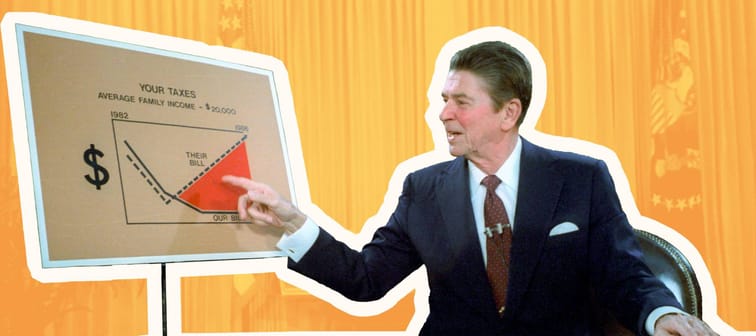The Great Inflation of the 1970s and 80s
Experts have drawn parallels between the high inflation of five decades ago and what’s happening today.
Back then, there were several factors that played into it, low unemployment, the removal of the gold standard (the monetary system in which a currency is backed by gold), but energy prices pushed things to their limit.
In 1973, the price of oil nearly quadrupled when members of the Organization of the Petroleum Exporting Countries (OPEC) enforced an oil embargo on the U.S. and other countries that supported Israel in the Yom Kippur War. There was a series of knock-on effects that caused inflation and stagnation to swell. Then, the Iranian Revolution at the end of the decade sent oil prices surging again.
By 1980, inflation was at 14.5% and unemployment hit 7%. The Federal Reserve hiked its federal funds rate to a whopping 17% (for comparison, it’s currently at 3.75% to 4%).
The high interest rate made getting ahead almost impossible, says Mike Drak, who was a banker at the time. He remembers his mortgage rate was 17.5% at the time.
“Rates were going up, it was almost monthly, they were increasing,” Drak says. “So it seemed like it was something that that didn't seem like it was ever going to stop. And I remember saying at one point, ‘If I could ever find one day where I could find a mortgage rate for 10%, I'd be the happiest person in the world.’”
Drak is the author of Victory Lap Retirement and Retirement Heaven or Hell: Which Will You Choose and a senior contributor at Booming Encore, a finance blog focused on the baby boomer generation.
Kiss Your Credit Card Debt Goodbye
Having a single loan to pay off makes it easier to manage your payments, and you can often get a better interest rate than what you might be paying on credit cards and car loans.
Fiona is an online marketplace offering personalized loan options based on your unique financial situation.
When you consolidate your debt with a personal loan, you can roll your payments into one monthly installment. Find a lower interest rate and pay down your debt faster today.
Get StartedPay down debt
Debt at that time rose quickly, says Drak — on houses, on credit cards and on vehicles.
“It was tough, scary times. But we were lucky because we could work. So our wages kept increasing — not at the same pace — but it necessitated both people working to help pay down debt.”
One of the most important things you can do during times of high interest is pay down debt, he says. His goal at the time was to pay down his mortgage, which wasn’t easy.
“You have to have a lot of discipline, you'd have to say I want to make lump sum additions annually on it, because the interest rate was crushing and I didn't want to be trapped.”
Brad Lyons suggests people stay away from credit card debt especially.
“Pay off debt as much as [you] can, to the extent that [you’re] able to do so,” he said.
Paying down debt, especially now, might sound daunting, but there are a couple different tactics you can use, like the avalanche method and the snowball method.
Stay invested
As tempting as it is to take out money from your investment accounts, especially as you watch numbers take a dive, Lyons cautions not to give in to that temptation.
“During periods where you have decreased valuations in the stock markets, nobody likes to see their valuations in their accounts go down, their retirement plan accounts that they have become accustomed to seeing going up and up and up year after year after year,” Lyons says. “And now they're seeing it go down some, but it's going to come back over time.”
For younger generations, he says, this is an opportunity to invest at a lower price, if you can afford it.
“What we're suggesting is that people remain invested, maintain their asset allocation that was designed in order to achieve their goals and objectives in the timeframes that they have set for themselves and continue to add to their investment portfolio through their retirement account savings.”
Dollar cost averaging is one of the most trusted strategies. It’s investing the same amount of money at regular intervals, regardless of what the market is doing.
"By taking advantage of lower valuations you’re effectively buying more shares at a lower price,” says Lyons.
Stop overpaying for home insurance
Home insurance is an essential expense – one that can often be pricey. You can lower your monthly recurring expenses by finding a more economical alternative for home insurance.
SmartFinancial can help you do just that. SmartFinancial’s online marketplace of vetted home insurance providers allows you to quickly shop around for rates from the country’s top insurance companies, and ensure you’re paying the lowest price possible for your home insurance.
Explore better ratesSave your pennies
Although it can be hard when every trip to the grocery store is costing you more, and the price of everything is going up, both Drak and Lyons say saving is hugely important, and it can also be advantageous.
“As interest rates continue to rise, we will begin to see interest rates higher in our savings accounts, and newly issued fixed income securities,” says Lyons.
If you stick your money in a high yield savings account, it’s going to grow faster than it would have even just at the beginning of this year. And although that probably won’t keep pace with current inflation, it helps to build a safety net.
Get settled in for the long haul
The 1980s was a long decade. There were two recessions and it was years before inflation was under control and interest rates began to drop.
And although our current situation is a little different, if there’s anything to be learned from the past, it’s that inflation and higher interest rates will be here for a while yet.
“Bear down,” Drak tells younger generations going through a similar financial landscape. “Try to work as hard as [you] can and make as much money as [you] can, and be as frugal as [you] can. That's the key. And there's no way around it. You have to be prudent. You have to pull back and you have to watch your pennies.”
Sponsored
Follow These Steps if you Want to Retire Early
Secure your financial future with a tailored plan to maximize investments, navigate taxes, and retire comfortably.
Zoe Financial is an online platform that can match you with a network of vetted fiduciary advisors who are evaluated based on their credentials, education, experience, and pricing. The best part? - there is no fee to find an advisor.







